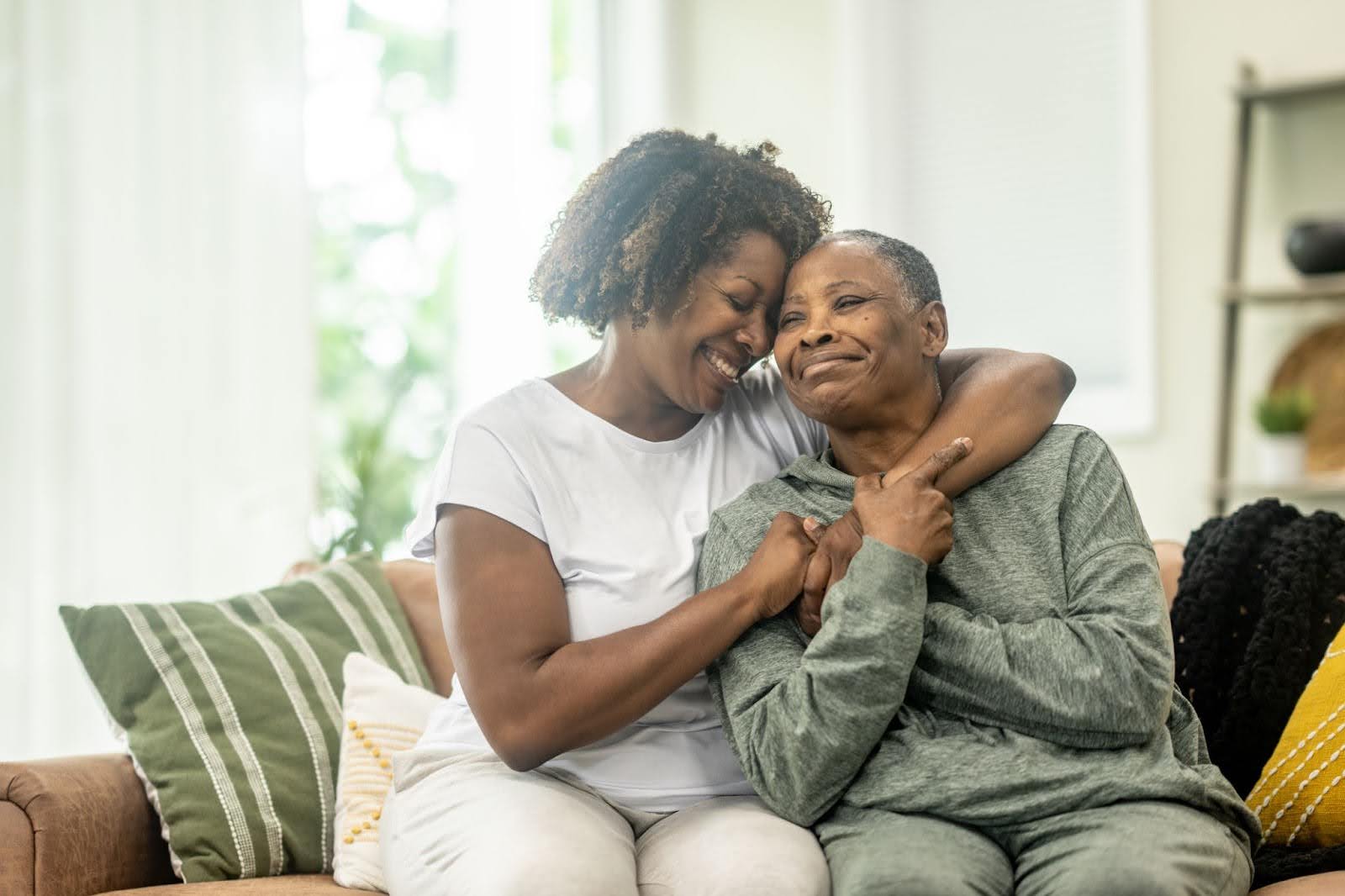Caring for someone with dementia is an emotional and challenging journey that requires patience, understanding, and compassion. Dementia, including Alzheimer’s disease, is a progressive condition that affects a person’s memory, thinking, and daily functioning.
As dementia progresses, caregiving responsibilities can evolve, creating unique challenges for family caregivers. Whether you are helping a person with dementia with daily activities like bathing, dressing or meal preparation, understanding how dementia progresses can make caregiving more manageable and fulfilling.
By following essential dementia caregiver tips, such as establishing a consistent routine, creating a safe environment, practicing patience, and taking care of yourself, you can make the caregiving journey more manageable and improve your loved one’s quality of life.
Understanding the stages of dementia and how they impact your loved one will guide you in providing the best possible care, fostering compassion, and reducing stress for both you and your loved one.
Understanding Dementia and Its Impact on Caregiving
To care for a loved one with dementia effectively, it’s essential to understand the condition and its stages. Memory loss, difficulty with communication, and changes in behavior are common symptoms, but they manifest differently for each person. As the disease progresses, the individual may need increasing levels of assistance with personal care, memory support, and daily activities.
For a family caregiver, the caregiving journey can be overwhelming, but knowing the stages of dementia and how it affects your loved one can help guide your approach with empathy. Understanding how dementia affects a person’s abilities helps caregivers manage daily activities, reduce stress, and foster patience, ultimately improving the caregiving experience for both parties.
Additionally, having a supportive community to lean on is crucial. Communities like Radford Green Health Care and Rehabilitation offer resources and educational opportunities that help caregivers navigate their caregiving journeys with greater confidence and support.
Tamara Solari, Administrator at Radford Green said, “When caregivers gain knowledge about their loved one’s condition, it not only alleviates the uncertainty and stress they often face, but it also equips them with the skills to better respond in the moment. This deeper understanding fosters patience, empathy, and a sense of empowerment.”
Establish a Routine
Routine is an effective way to reduce confusion and anxiety for a loved one with dementia. A predictable schedule creates structure and comfort, especially as memory loss progresses. It makes daily activities easier and reduces stress for both the person with dementia and the caregiver. Consistent routines foster security, easing caregiving challenges.
Here are some simple dementia caregiver tips to help establish a helpful routine:
- Set Consistent Mealtimes: Serving meals at the same time every day helps your loved one know when to eat, reducing anxiety around mealtime.
- Incorporate Daily Exercise: Regular physical activity, like short walks or stretching, improves physical health, mood, and sleep.
- Engage in Familiar Activities: Encourage your loved one to enjoy activities they’ve done before, such as gardening, cooking or looking at old photos, to provide comfort and reduce stress.
- Create a Structured Bedtime Routine: A calming bedtime routine, like reading a favorite book or listening to soothing music, promotes better sleep and reduces restlessness.
- Incorporate Rest Periods: Schedule rest or quiet time throughout the day to avoid overstimulation and fatigue.
- Use Visual Cues: Place reminder notes or pictures around the home to guide your loved one through tasks like dressing or using the bathroom.
- Prepare for Transitions: If the schedule needs to change (for appointments or visitors), give your loved one plenty of notice, and use calming techniques to ease into new activities.
A predictable routine helps make daily life easier for both the caregiver and the person with dementia. With consistency and planning, a caregiver can create a stable, nurturing environment that supports their loved one’s physical and emotional well-being.

Create a Safe Environment
As dementia progresses, the risk of accidents or confusion increases. Adapting the home environment is crucial to ensure your loved one’s safety while promoting independence.
Here are some tips for a dementia-friendly home:
- Remove tripping hazards, such as rugs, clutter or electrical cords.
- Label household items or rooms to help your loved one find things easily.
- Store medications in a safe, easily accessible location.
- Install grab bars in bathrooms, and remove sharp objects from the environment.
- Use night-lights to avoid falls and confusion at night.
A safe and structured environment can help your loved one maintain their independence while providing peace of mind for the caregiver.
Practice Patience and Compassion
Managing the behavioral changes that come with dementia can be one of the most challenging aspects of caregiving. People with dementia may experience frustration, agitation or confusion, which can lead to difficult behaviors.
Redirection is an effective strategy for managing upset moments. Gently shift your loved one’s focus to something familiar or comforting, and offer reassurance while validating their feelings to maintain a calm atmosphere.
When communicating, use simple language and a calm tone. Remember, it’s important to approach each day with empathy and avoid frustration. The caregiving journey can be emotionally taxing, but staying calm and compassionate helps both the caregiver and the person with dementia navigate these challenges.
Take Care of Yourself
Caring for a loved one with dementia can be overwhelming, but it’s important to take care of yourself to avoid burnout and exhaustion. It’s okay to ask for help, set realistic expectations, and prioritize your well-being. By taking breaks and focusing on your health, you’ll be able to provide long-term support for your loved one.
Here are some simple dementia caregiver tips for taking care of yourself:
- Eat Nutritious Meals: Fuel your body with balanced, nutritious meals. Skipping meals or eating poorly can lead to low energy and mood swings.
- Get Regular Exercise: Physical activity boosts your mood and reduces stress. Even a short walk or stretching session each day can make a big difference.
- Take Breaks When Possible: Step away for a few minutes to relax, clear your mind or enjoy a personal activity. Regular breaks help prevent burnout and support your emotional health.
- Set Realistic Expectations: Understand that you’re doing your best, and it’s okay not to be perfect. Focus on what truly matters and let go of unnecessary pressures.
- Make Time for Joy: Engage in activities that bring you joy, like reading, painting or spending time with friends.
- Consider Respite Care: If you need a break, consider respite care services. They provide temporary relief and ensure your loved one gets the care they need while you recharge.
Caring for yourself isn’t just important for your health—it’s key to your ability to care for your loved one. By prioritizing self-care, you’ll be better equipped to handle the challenges of dementia caregiving with patience and energy.
Find Support Through Groups or Seminars
Navigating the challenges of dementia care can feel isolating, but connecting with others in similar situations can provide emotional support and practical tips. Joining a caregiver support group or attending educational seminars can help you share experiences, learn new caregiving strategies, and find solidarity.
Radford Green offers caregiver support seminars and groups that allow caregivers to learn from one another, share challenges, and find resources to make caregiving more manageable. These gatherings offer both emotional and practical support, making the caregiving journey a little less overwhelming.
As Tamara explains, “It transforms the caregiving journey into one of connection and care, rather than just responsibility. Joining a support group is an invaluable resource for both caregivers and their loved ones with dementia. It provides a safe space where individuals can share experiences, learn from one another, and gain emotional support from those who truly understand their challenges. By connecting with others in similar situations, caregivers are better able to navigate the complexities of dementia care, ultimately fostering a more compassionate, less stressful caregiving experience for everyone involved.”
Explore Professional Help
When professional help is needed, memory care services offer specialized, supportive care for individuals with dementia. Radford Green’s memory care programs provide compassionate care that supports dignity and quality of life. If you’re considering professional caregiving options, consult with our knowledgeable team to guide your decision.

Join Us for Caregiver Support at Radford Green Health Care and Rehabilitation
If you are looking for a compassionate community and practical resources to support your caregiving journey, consider joining us at Radford Green at Sedgebrook. The Caregiver Support Group at Radford Green will meet on January 16, 2025, at 4 p.m. in the health center’s main conference room. This group is a great way to connect with other caregivers, learn helpful tips, and gain valuable insights to assist in your caregiving journey.
Join us at Radford Green at Sedgebrook for our caregiver support group and events designed to help you navigate the challenges of dementia care. Contact us today to learn more about our memory care program and upcoming events.



